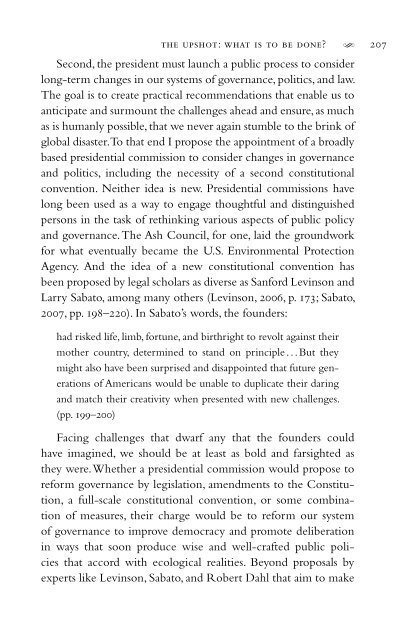Down to the wire : confronting climate collapse / David - Index of
Down to the wire : confronting climate collapse / David - Index of
Down to the wire : confronting climate collapse / David - Index of
Create successful ePaper yourself
Turn your PDF publications into a flip-book with our unique Google optimized e-Paper software.
<strong>the</strong> upshot: what is <strong>to</strong> be done? S 207<br />
Second, <strong>the</strong> president must launch a public process <strong>to</strong> consider<br />
long-term changes in our systems <strong>of</strong> governance, politics, and law.<br />
The goal is <strong>to</strong> create practical recommendations that enable us <strong>to</strong><br />
anticipate and surmount <strong>the</strong> challenges ahead and ensure, as much<br />
as is humanly possible, that we never again stumble <strong>to</strong> <strong>the</strong> brink <strong>of</strong><br />
global disaster. To that end I propose <strong>the</strong> appointment <strong>of</strong> a broadly<br />
based presidential commission <strong>to</strong> consider changes in governance<br />
and politics, including <strong>the</strong> necessity <strong>of</strong> a second constitutional<br />
convention. Nei<strong>the</strong>r idea is new. Presidential commissions have<br />
long been used as a way <strong>to</strong> engage thoughtful and distinguished<br />
persons in <strong>the</strong> task <strong>of</strong> rethinking various aspects <strong>of</strong> public policy<br />
and governance. The Ash Council, for one, laid <strong>the</strong> groundwork<br />
for what eventually became <strong>the</strong> U.S. Environmental Protection<br />
Agency. And <strong>the</strong> idea <strong>of</strong> a new constitutional convention has<br />
been proposed by legal scholars as diverse as Sanford Levinson and<br />
Larry Saba<strong>to</strong>, among many o<strong>the</strong>rs (Levinson, 2006, p. 173; Saba<strong>to</strong>,<br />
2007, pp. 198–220). In Saba<strong>to</strong>’s words, <strong>the</strong> founders:<br />
had risked life, limb, fortune, and birthright <strong>to</strong> revolt against <strong>the</strong>ir<br />
mo<strong>the</strong>r country, determined <strong>to</strong> stand on principle . . . But <strong>the</strong>y<br />
might also have been surprised and disappointed that future generations<br />
<strong>of</strong> Americans would be unable <strong>to</strong> duplicate <strong>the</strong>ir daring<br />
and match <strong>the</strong>ir creativity when presented with new challenges.<br />
(pp. 199–200)<br />
Facing challenges that dwarf any that <strong>the</strong> founders could<br />
have imagined, we should be at least as bold and farsighted as<br />
<strong>the</strong>y were. Whe<strong>the</strong>r a presidential commission would propose <strong>to</strong><br />
reform governance by legislation, amendments <strong>to</strong> <strong>the</strong> Constitution,<br />
a full-scale constitutional convention, or some combination<br />
<strong>of</strong> measures, <strong>the</strong>ir charge would be <strong>to</strong> reform our system<br />
<strong>of</strong> governance <strong>to</strong> improve democracy and promote deliberation<br />
in ways that soon produce wise and well-crafted public policies<br />
that accord with ecological realities. Beyond proposals by<br />
experts like Levinson, Saba<strong>to</strong>, and Robert Dahl that aim <strong>to</strong> make
















